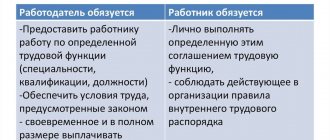Subtleties of hiring people of retirement age
The main emphasis when hiring is on compliance with labor laws. They may enter into:
- Permanent contracts.
- Urgent with a clearly defined date.
- Part-time agreement.
- Contract, if a citizen plans to perform household work. The contract version is agreed upon by both parties. When hiring a pensioner, the following nuances must be observed:
- There must be a probationary period, as with the admission of other citizens. It is established by mutual agreement and this condition is indicated in the employment contract.
- A medical certificate with permission to work is required. Employers are often reluctant to hire retirees because they doubt their health will allow them to perform their duties. Therefore, a medical record will confirm your ability to work.
- There is a possibility of part-time work. There are no direct prohibitions on performing multiple duties.
- Guarantees and compensation under the employment contract remain.
- Full and part-time work available. There is an opportunity to work night shift.
A pensioner must carefully check his health and bring all the necessary certificates to the employer.
Disadvantages associated with employing retirees
However, in addition to the provision of benefits, working pensioners are deprived of financial incentives in some areas.
The disadvantages of working on a well-deserved rest include:
lack of social benefits provided to non-working pensioners;
transportation costs are not reimbursed when applying to a sanatorium-resort treatment;
no subsidies provided
However, despite some difficulties in combining work and retirement, the answer to the question of whether it is beneficial for a retiree to work in 2021 is obvious. The material component in this case will certainly be significant.
How to register correctly
Pensioners are hired on the same principle as other citizens:
- A person is looking for a vacancy and undergoing an interview. After this, an application for employment is submitted.
- Documentation is prepared and provided to the employer. After which an agreement is concluded.
- The citizen must study in detail the regulations and other documentation and sign, confirming his agreement with the established rules.
- The employer draws up an order and gives it to the employee for signature.
- An occupational safety briefing is carried out and the pensioner signs for it.
After reading all the conditions and signing the documents, the citizen can begin to fulfill his duties.
Documentation
A pensioner should come to the employer with:
- passport;
- pension certificate;
- SNILS insurance certificate;
- documents on the level of qualifications and acquired profession;
- Taxpayer Identification Number, if available.
A work book is also required if registration is carried out using it.
Is it profitable for a pensioner to work?
So, a working pensioner cannot count on indexation of his pension. In accordance with Art. 26.1 FZ-400, starting from 2021, the indexation of their content is “frozen”, while the pension amount is adjusted, but by a different percentage. In accordance with the same norm, after dismissal and termination of employment, the pension is adjusted taking into account all indexations carried out while the citizen was working.
Also, a working pensioner is not entitled to the following payments:
- social old-age pension, while continuing to work, it is not assigned on the basis of Art. 11 FZ-166 - if it turns out that such a pensioner has started working, they will be forced to return the pension;
- social supplement to pension to ensure income at the subsistence level in accordance with Art. 12.1 FZ-178;
- various regional surcharges in accordance with local legislation. As a rule, the condition for their appointment is termination of employment.
Hiring a pensioner without a work book and the nuances of the contract
Usually, when an employee starts work, the employer makes an entry in the work book. But, if the pensioner does not provide this document, then the agreement is concluded without it.
This agreement will be proof that the citizen is working and gaining experience.
Attention! But if no entries are made in the work book, this is considered a violation. The need to record information in a document is indicated in Art. 66 Labor Code of the Russian Federation.
In some cases, it is allowed to work without an appointment, but to do this they must enter into a part-time contract or a civil law agreement.
Information may not be provided if the pensioner cooperates with a private person. In this situation, the citizen does not have the right to independently make changes to the document. If there is no work record, then there are several options for solving the problem.
It all depends on the reason why a person does not have the necessary documentation:
- It is allowed to create a new work book if the old one has been lost.
- Ask for a certificate from your previous place of work and draw up a part-time contract.
- Conclude a contract or civil contract. But the employee must be informed about this about the lack of paid leave and sick leave.
The method is chosen by the employer, taking into account the current situations. It is prohibited to enter into a fixed-term contract only because a person has reached retirement age.
If an employer forces a citizen to enter into a fixed-term contract because of his age, this is considered discrimination and a violation of rights.
Article 59 of the Labor Code identifies a number of grounds for concluding such an agreement:
- A pensioner is hired for seasonal work.
- The citizen is hired as a replacement.
- Planned to work abroad.
- It is preferable to hire for a period of 2 months.
- The pensioner will carry out activities that are not related to the direction of the company.
- The employee is hired for a specific job, and the cooperation ends after fulfilling the duties specified in the act.
If these conditions do not exist, then it is possible to hire a citizen of retirement age under a fixed-term contract only if he gives his consent to this. Usually, if a pensioner gets a job, it is necessary to conclude an employment contract that guarantees the safety of the employee.
In cases where the employer enters into a fixed-term agreement and the supervisory authorities find out about this, the agreement will be reclassified as permanent. It is illegal to enter into a fixed-term contract without grounds for it. But in practice, the rule is observed only in relation to pensioners who took early retirement. In reality, employers persuade employees to sign a fixed-term contract.
What really happened
The source of rumors and a wave of news about fines for pensioners receiving illegal income is a publication on the website ussurmedia.ru. The article states, verbatim, “working pensioners were warned of a fine of 120 thousand rubles.” What is this punishment for? For “part-time work”, “unofficial employment”, which leads, as the author of the article puts it, to “a kind of fraud”. After all, a working pensioner does not have the right to pension indexation.
Thus, an unofficially working pensioner, hiding information about additional income and employment, receives an increased amount of support illegally. And law enforcement agencies will be able to obtain information from the tax office, which tracks income in accounts, and from the Pension Fund, which controls the employment of citizens.
At the same time, the author does not provide any links to regulations (they are not in the article at all), nor to publications from official websites of government agencies. Dubious news has also migrated to some news sites, for example, ura.ru.
Advantages and disadvantages of hiring without registration
Many citizens prefer informal employment. There are a number of advantages to this, but there are certain disadvantages as this option cannot be considered safe.
For a pensioner
A pensioner who is not registered as a labor pensioner will receive the same pension that was assigned to him; its amount will not be cut off. Such activities often involve a flexible schedule, thanks to which employees have the opportunity to choose a convenient time to complete their duties. Although there will be no notes in the work book, the work contract is used as evidence of the period of time worked.
But there are many more disadvantages to this employment option:
- An employee cannot count on receiving sick leave, vacation, maternity benefits, or compensation in the event of a work injury.
- Experience is not accrued, so it will be difficult to prove that you have experience at your next job.
- There are no bonuses.
- The employer may not fulfill its obligations to contribute to the pension fund and pay for health insurance.
- The pensioner must pay taxes himself from the amount received.
- It is possible to terminate an employment contract at any time, even if it has not yet expired.
- An employer can fire illegally and still not pay wages, and the employee will not be able to complain anywhere.
- The worker can be fined at any time.
Therefore, before hiring, you should weigh all the pros and cons of this option in order to avoid difficulties in the future.
For the employer
It is convenient for company owners to hire informally, as this:
- Allows you to avoid paying taxes.
- Set a salary less than the amount established by law.
- Do not pay vacation and sick pay to employees.
- Involve subordinates in any work.
- Fire people without explanation or provision of wages.
- Fail to follow safety regulations and create a safe working environment for employees.
But not everything is as good as it seems at first glance. For this the employer:
- Bears tax, criminal and administrative liability.
- Can be punished for lack of transfers to the Social Insurance Fund and the pension fund.
In addition to large fines for hiring without registration, other more serious penalties are possible.
For more information on hiring retirees, watch the video:
Fresh vacancies for retired men
Today, work for pensioners in Moscow is available from a wide list of vacancies on the Internet in the section work for pensioners. To find fresh vacancies, retirees in Moscow who do not have sufficient experience in the required industry or who do not have the required level of education are advised to consider fresh vacancies for retired women and men for unskilled work.
This type of activity, as a rule, is not associated with any physical or mental stress, and has a sliding or free work schedule. In addition to offers from employers, older job seekers are advised to create a resume for posting on the website, then there will be a good opportunity to successfully find a job, as fresh vacancies for retired men and women appear regularly. You can also take advantage of an additional opportunity if the applicant himself tries to get in touch with the employer and offers his services in a particular field of activity. To do this, you just need to look through all the offers in the section of work for pensioners in Moscow, which the Job 7 website offers, and choose the employer to cooperate with with whom it will be most optimal. The work for retirees section presents fresh vacancies for retired men and women, and work for retirees in a wide variety of industries. Today, work for retirees in Moscow is available in a large number of companies. In order for pensioners to enjoy a job with a decent salary, it is recommended to create a resume on the Rabota7.ru website, in the section on work for pensioners. Work for pensioners in Moscow
Responsibility of the employer for failure to draw up an employment contract
According to current legislation, responsibility for the unofficial employment of a pensioner extends to:
- the head of the organization or his authorized representative;
- individual entrepreneur;
- company.
Responsibility for failure to register an employee, which applies to an official, is divided into the following types:
- Administrative. For a single violation, the fine can be up to 20,000 rubles. If the incident occurs again within 12 months, the director may be disqualified for up to 3 years.
- Tax office. By paying unofficial earnings, the employer does not withhold the necessary taxes and does not make insurance contributions. Tax liability implies the collection of arrears, penalties and fines, but often the application of these sanctions occurs not in relation to the official, but to the organization as a whole.
- Criminal. Liability arises with personal interest in non-transfer of tax payments and large arrears (over 5,000,000 rubles). The fine that can be awarded to an official reaches 300,000 rubles. Other punishment options are imprisonment for up to 2 years or forced labor of a similar duration. In case of particularly large arrears (over 15,000,000 rubles), the manager may be subject to imprisonment for up to 6 years.
Fine for individual entrepreneurs
As a subject of labor relations, an individual entrepreneur must comply with the requirements of current legislation. The liability to which he may be held when revealing facts of improper registration of pensioners has the following features:
- Administrative. Parts 4 and 5 of Article 5.27 of the Code of Administrative Offenses of the Russian Federation provide for punishment for failure to register an employee in the required manner (for example, evasion of concluding an employment contract) - this is a fine of 5,000 rubles. up to 10,000 rub. If you are brought to administrative responsibility again, the penalties increase - from 30,000 rubles. up to 40,000 rubles.
- Tax office. Since during informal employment the entrepreneur does not fulfill the obligation to withhold personal income tax, then according to the Tax Code of the Russian Federation, he must pay the arrears that have arisen, penalties (for each day - 1/300 of the refinancing rate of the Central Bank of the Russian Federation) and a fine of 20% of the unpaid amount. Unpaid insurance premiums are also subject to reimbursement along with accrued penalties and penalties in the amount of 20% of the unpaid insurance premium.
- Criminal. Occurs if improper transfer of taxes and necessary fees, which led to a large arrears (in the amount of 5,000,000 rubles), was carried out in the personal interests of the violator. In case of criminal liability of an individual entrepreneur, the punishment is similar to that to which an official of an enterprise may be subjected - a fine of up to 300,000 rubles. or up to 2 years imprisonment.
- Dogo Canario - history, purpose and breed standard, character, care and health
- What medications should you have in your first aid kit during self-isolation?
- Negative emotions can be deadly
Fine for an unregistered LLC employee
In case of unofficial employment of workers (including pensioners), the legislation also provides for liability for legal entities. It is divided into the following types:
- Administrative . This is a fine of up to 100,000 rubles. for organizations in which violations were detected with the execution of employment contracts for personnel. If there is a repeat incident within 12 months, the amount of the penalty may increase to 200,000 rubles.
- Tax office. Non-payment of personal income tax and insurance fees is similar to penalties for individual entrepreneurs - full payment of all arrears with the addition of penalties and a fine of 20% of the unpaid amount.?
Probation
The possibility of establishing a probationary period when hiring is provided for in Art. 70 of the Labor Code. You can test a pensioner. Pensioners are not included in the list of persons for whom no employment test is imposed. This means that general rules apply to them. The duration of the test depends on the type of contract concluded, which are presented in the table:
| Type of agreement | Duration of probationary period |
| Fixed-term and open-ended contracts for management positions and chief accountant | Up to 6 months |
| Open-ended and fixed-term contracts up to 6 months | Up to 3 months |
| Fixed-term contract up to 6 months | Up to 2 weeks |
| Fixed-term contract up to 2 months | Not installed |
| Part-time agreement | Defined as under an open-ended contract |
| Civil contract | Not installed |







